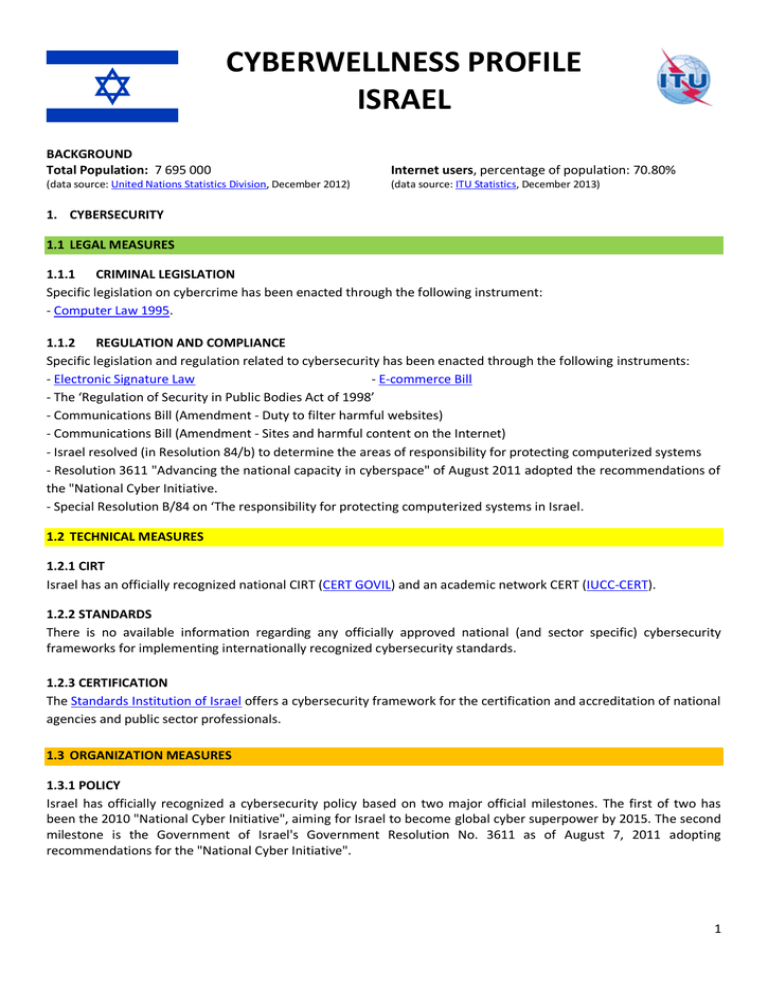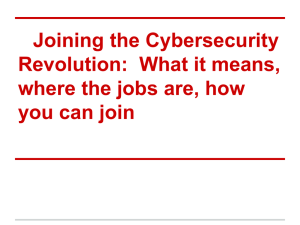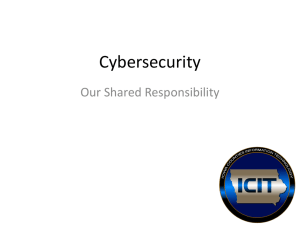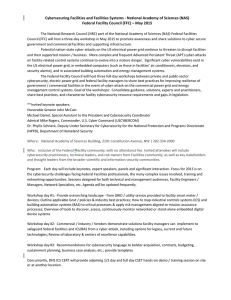CYBERWELLNESS PROFILE ISRAEL
advertisement

CYBERWELLNESS PROFILE ISRAEL BACKGROUND Total Population: 7 695 000 Internet users, percentage of population: 70.80% (data source: United Nations Statistics Division, December 2012) (data source: ITU Statistics, December 2013) 1. CYBERSECURITY 1.1 LEGAL MEASURES 1.1.1 CRIMINAL LEGISLATION Specific legislation on cybercrime has been enacted through the following instrument: - Computer Law 1995. 1.1.2 REGULATION AND COMPLIANCE Specific legislation and regulation related to cybersecurity has been enacted through the following instruments: - Electronic Signature Law - E-commerce Bill - The ‘Regulation of Security in Public Bodies Act of 1998’ - Communications Bill (Amendment - Duty to filter harmful websites) - Communications Bill (Amendment - Sites and harmful content on the Internet) - Israel resolved (in Resolution 84/b) to determine the areas of responsibility for protecting computerized systems - Resolution 3611 "Advancing the national capacity in cyberspace" of August 2011 adopted the recommendations of the "National Cyber Initiative. - Special Resolution B/84 on ‘The responsibility for protecting computerized systems in Israel. 1.2 TECHNICAL MEASURES 1.2.1 CIRT Israel has an officially recognized national CIRT (CERT GOVIL) and an academic network CERT (IUCC-CERT). 1.2.2 STANDARDS There is no available information regarding any officially approved national (and sector specific) cybersecurity frameworks for implementing internationally recognized cybersecurity standards. 1.2.3 CERTIFICATION The Standards Institution of Israel offers a cybersecurity framework for the certification and accreditation of national agencies and public sector professionals. 1.3 ORGANIZATION MEASURES 1.3.1 POLICY Israel has officially recognized a cybersecurity policy based on two major official milestones. The first of two has been the 2010 "National Cyber Initiative", aiming for Israel to become global cyber superpower by 2015. The second milestone is the Government of Israel's Government Resolution No. 3611 as of August 7, 2011 adopting recommendations for the "National Cyber Initiative". 1 1.3.2 ROADMAP FOR GOVERNANCE The Israel’s government Resolution No. 3611 provides the national governance roadmap for cybersecurity in the Israel. 1.3.3 RESPONSIBLE AGENCY There are two regulators that monitor and coordinate the implementation of a national cybersecurity strategy, policy and roadmap in Israel: ‘The top steering committee for the protection of computerized systems in the State of Israel,’ and ‘the national unit for the protection of vital computerized systems.’ While the steering committee has a policy perspective, the ‘national unit’ - National Information Security Authority (NISA) - has the professional authority. 1.3.4 NATIONAL BENCHMARKING The Israel National Cyber Bureau (INCB) is the officially recognized national or sector-specific benchmarking exercise or referential used to measure cybersecurity development as it is working towards the establishment of a national cyber situation assessment and the definition of the national cyber threat reference. 1.4 CAPACITY BUILDING 1.4.1 STANDARDISATION DEVELOPMENT The Israel National Cyber Bureau (INCB) is the officially recognized national or sector-specific research and development (R&D) program/project for cybersecurity standards, best practices and guidelines to be applied in either the private or the public sector as it publishes various "warnings" and "preventive practices" and programs to prioritize the cyber defense industry, in cooperation with the Chief Scientist of the Ministry of Industry, Trade and Labor. 1.4.2 MANPOWER DEVELOPMENT The Israel National Cyber Bureau (INCB) will provide various types of educational and professional training programs for raising awareness with the general public, promoting cybersecurity courses in higher education and promoting certification of professionals in either the public or the private sectors such as the "national education plans", commonly aimed at "increasing public awareness" to cyber threats. The INCB also established a committee for the definition of the cyber professions. 1.4.3 PROFESSIONAL CERTIFICATION There is no available information regarding the exact number of public sector professionals certified under internationally recognized certification programs in cybersecurity. 1.4.4 AGENCY CERTIFICATION Israeli national CIRT (CERT GOVIL) and the academic network CERT (IUCC-CERT) are the officially recognized certified government and public sector agencies certified under internationally recognized standards in cybersecurity. 1.5 COOPERATION 1.5.1 INTRA-STATE COOPERATION The INCB coordinates national and international exercises as well as cooperation with parallel bodies abroad. The Bureau acts to develop foreign relations in the cyber field with friendly countries for various purposes such as information sharing, mutual R&D and more. 2 1.5.2 INTRA-AGENCY COOPERATION The Israel National Cyber Bureau (INCB) is the officially recognized national program for sharing cybersecurity assets within the public sector. The INCB advances coordination and cooperation between governmental bodies, the defense community, academia, industrial bodies, business and other bodies relevant to the cyber field. 1.5.3 PUBLIC SECTOR PARTNERSHIP The Israel National Cyber Bureau (INCB) is the officially recognized national or sector-specific program for sharing cybersecurity assets within the public and private sector. The INCB promotes cybersecurity within the civilian and private sectors, in cooperation with other government offices. 1.5.4 INTERNATIONAL COOPERATION Israel is a member of the ITU-IMPACT initiative and has access to relevant cybersecurity services. Also the Israel National Cyber Bureau (INCB) coordinates national and international exercises as well as cooperation with parallel bodies abroad. 2. CHILD ONLINE PROTECTION 2.1 NATIONAL LEGISLATION Specific legislation on child online protection has been enacted through the following instrument: - Article 214 of the Criminal Code. 2.2 UN CONVENTION AND PROTOCOL Israel has acceded, with no declarations or reservations to articles 16, 17(e) and 34(c), to the Convention on the Rights of the Child. Israel has acceded, with no declarations or reservations to articles 2 and 3, to the Optional Protocol to The Convention on the Rights of the Child on the Sale of Children, Child Prostitution and Child Pornography. 2.3 INSTITUTIONAL SUPPORT The following supports provide information on internet safety for parents, children and educators: - The Ministry of Education (*) offers different tools for parents, teachers and children about online safety. - The website http://safe.org.il/ provides information on safe internet for parents, children and educators. - The IUCC Computer Emergency Response Team (IUCC CERT) is responsible for Israeli cybersecurity in higher education. It has no specific information on child online protection. 2.4 REPORTING MECHANISM The academic network CERT (IUCC-CERT) provides the following email address to report a computer incident: cert@cert.ac.il. Also the website ISOC-IL provides an online reporting form. ----------------------------------------------------------------------------------------------------------------------------------------------------------DISCLAIMER: Please refer to http://www.itu.int/en/Pages/copyright.aspx More information is available on ITU website at http://www.itu.int/en/ITU-D/Cybersecurity/Pages/default.aspx Last updated on 22th January 2015 3


